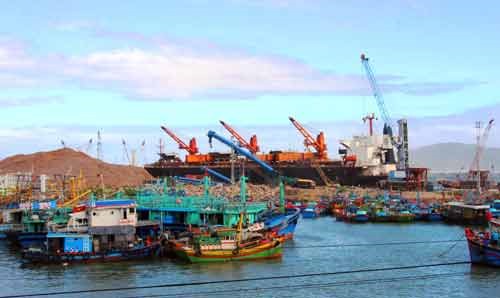[ad_1]
Tan Cang-Quy Nhon JSC in the central coastal province of Bình Định has been dumping soil and stone into waters surrounding Quy Nhon Port in order to expand the port’s warehouse, worsening crowding issues and threatening its status as a first-grade port, danviet.vn online newspaper has reported.

Tân Cảng-Quy Nhơn JSC in the central coastal province of Bình Định has been dumping soil and stone into waters surrounding Quy Nhơn Port in order to expand the port’s warehouse, worsening crowding issues and threatening its status as a first-grade port. — Photo danviet.vn
The Fisheries Law, issued by the National Assembly in November 2017, stipulates that a first-grade port must have water area of at least 20ha. Đào Xuân Thiện, director of Bình Định Province’s Port Management Board, said he worries that as Tân Cảng-Quy Nhơn JSC pours waste materials into the water behind the wharf, the facility will no longer meet the water area criterion and will be downgraded to a second-grade port.
This would mean that the fishing port would lose its central investment, which in turn would eliminate the opportunity to lure foreign fishing vessels to the port, causing many disadvantages for Bình Định Province, according to Thiện.
Phạm Văn Thành, Director of Tân Cảng-Quy Nhơn JSC, told danviet.vn online newspaper that Bình Định Province People’s Committee granted a land-use license for the western area of Quy Nhơn fishing port to his company.
According to the license, the provincial People’s Committee leased 121,560sq.m over a 50-year period for the company to build a container port. The enterprise will have to pay an annual land rental fee.
So far the company has only built two wharves and two storage facilities. Thành said the company intends to fill the remaining 7ha of water surface to construct storage units.
He confirmed the pouring of stone, soil and construction waste materials into the water area.
“It is waste material in the port, temporarily poured into water area we rent. It isn’t wrong, as it falls under the authority of our enterprise, so we haven’t consulted the local authorities,” Thành said.
In the rainy season, a large number of fishermen’s boats shelter in the port to avoid storm. Combined with the activities of the port, that has caused crowding, the entrance to the port is often jammed.
In particular, sedimentation and encroachment will have a long-term impact on large vessels when these vessels seek shelter at Quy Nhơn fishing port.
Nguyễn Anh Dũng, deputy director of Quy Nhơn Fishing Port, said: “The construction of Quy Nhơn port’s wharf not only narrows the port, but also prevents flood flow especially in the rainy season.”
The clamping of the water inlet results in congestion, he said, adding that in recent months there have even been collisions between boats in the heavily trafficked and shrinking waters.
Meanwhile, Đặng Trung Thành, Director of Bình Định Province’s Natural Resources and Environment Department, said his unit implemented an environmental impact assessment for Quy Nhơn fishing port before assigning land to the Tân Cảng-Quy Nhơn JSC.
However, he acknowledged that since the project was assigned to Tân Cảng-Quy Nhơn JSC, the department hasn’t established any inspection team to supervise the company.
Trần Châu, Deputy Chairman of Bình Định Province People’s Committee, said that if Tân Cảng-Quy Nhơn JSC has poured stone and construction-waste into water area, the Quy Nhơn Fishing Port management board must issue a detailed report to provincial authorities.
The provincial People’s Committee hasn’t received any reports from the relevant offices. “We will have detailed guidance after receiving reports,” he said.—VNS
[ad_2]
Source link
